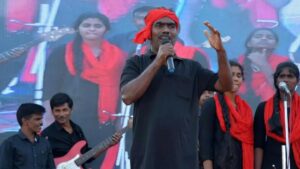This could be because satire is already deeply ingrained in the State’s popular culture.
by Siddarth Muralidharan, Saatvika Radhakrishna, Frontline of The Hindu, Chennai, November 16, 2023

The folk singer Kovan was arrested on sedition charges for his song “Moodu Tasmac-ai Moodu” in 2015. | Photo Credit: The Hindu Archives

Tamil periodicals, too, have traditionally used editorial cartoons to deliver stinging editorials. Vikatan’s political cartoons were renowned. Similarly, Thuglak, founded by the late actor and political commentator Cho Ramaswamy, did not mince its words when taking down politicians.
Pudhugai Boopalam Pragatheeswaran doing his show. | Photo Credit: YouTube screengrab
In 2015, when the popular folk singer and activist Kovan sang “Moodu Tasmac-ai moodu” (Shut down TASMAC), holding the then AIADMK government responsible for rampant alcoholism (the liquor trade is controlled by the State government), it got him arrested. Kovan’s work follows in the footsteps of Pattukottai Kalyanasundaram, a socialist lyricist whose songs delivered messages against private property, superstitions, and so on.
Around the mid-2000s, when “stand-up comedy” had not yet gained currency, popular Tamil television shows like Kalakkapovadhu Yaaru and Asathapovathu Yaaru were already featuring mimics, comedians, and mime artists. They were the breeding ground for many performers who went on to become film comics.
Highlights
- Besides mainstream cinema and music, art forms like villu paatu, bommalattam, and veedhi naadagam have liberally sprinkled contemporary political references into their classic routines.
- Tamil periodicals, too, have traditionally used editorial cartoons to deliver stinging editorials.
- Tamil Nadu also boasts a rich tradition of public debate known as pattimandram.
- Stand-up comedy, as a genre in Tamil Nadu is still nascent, but it could also be because caricature, parody, and political satire have always been an integral part of the Tamil stage and cinema culture.
Tradition of public debate
Tamil Nadu also boasts a rich tradition of public debate known as pattimandram. The televised pattimandram, slotted for prime-time morning slots on festival days, is an article of faith, with much importance given to pun, witty repartee, and turn of phrase. These sessions, which are presided over by Tamil scholars like Solomon Pappaiah and seasoned debaters such as Bharathi Baskar and S. Raja, nurture the rich argumentative tradition of Tamil society.
Among today’s stand-up artists, the genre of political satire is kept alive by performers like Pudhugai Boopalam Pragatheeswaran, who laces his shows with scathing and deeply political satire about issues like inflation, unemployment, caste, religion, and politics. Surprisingly, however, the hoary present realities of Tamil Nadu are not alluded to by most English or Tanglish performers. The leading ones, after starting off with themes around filter coffee, Mylapore, and vegetarianism later moved on to safe topics like NRIs, State board education, etc. When someone like Vikram Arul Vidyapathi tried to broach a topic like reservation in 2019, he was shot down by privilleged-caste critics.
The stand-up comedian Vikram Arul Vidyapathi performing in Erode. His recent “Christian School vs ‘Normal’ School” comedy video sparked discussions. | Photo Credit: Instagram
Karthik Kumar founded the collective Evam Stand-up Tamasha in 2009 and was one of the first comics in the State to perform stand-up. According to him, it is risky to openly mock or poke fun at the ruling party of the day. “Whether Munawar [Faruqui] or Vir [Das], there’s awareness that legal weapons like sedition or defamation can be slapped on us.” While Karthik admitted that comics in the South have a safety net their northern counterparts don’t, he also argued that the form had not yet come of age. “It’s been around in the West for about 80-90 years, so there’s an understanding about how it works and how it should be received. People are yet to understand it here.”
Sudarsan Ramamurthy, aka “Soda”, cracks jokes about Chennai traffic, marriage, or drinking, while Ramkumar Natarajan, aka “IT manager Annachi”, sticks to workplace dynamics. His Tirunelveli slang and IT office jokes are a big hit in the corporate circuit. Ironically, said Sudarsan, Chennai is the only city where a key comedy venue, The Medai, stands less than 100 metres from the Chief Minister’s house, but most stand-up artists avoid politics. As does Sudarsan. “I don’t follow political news,” he said, “and secondly, I am aware of my caste privilege.” That said, he does believe Chennai “will probably see political sets a few years down the line.”
Stand-up comedian Ramkumar Natarajan. | Photo Credit: YouTube screengrab
One reason why Karthik and Sudarsan advise playing it safe is because several English and Tanglish stand-ups also perform on OTT. “People don’t take offence when they are listening to a set live; they take offence when they are viewing it digitally,” said Sudarsan. Also, the medium’s reach eliminates the comedian’s control over content and how it is perceived or viewed.
Also Read | Editor’s Note: The power of political comedy in times of propaganda and censorship
Tamil language sets like Pragatheeswaran’s, in contrast, are performed live and often backed by progressive groups. Jenson Dhivakar’s sets on caste and caste-based politics are hugely popular. He also takes on an array of BJP leaders in his shows. His shows are aired on Kalaignar TV, which is owned by the DMK, and they are also available on YouTube. According to Ramkumar: “Many smaller, upcoming comedians have content with dark humour, caste, religion, social evils, and politics, but they don’t have a digital presence yet.”
Overall, however, Chennai sees low audience turnouts for stand-up shows, whatever the material. This could be because the genre is still nascent, but it could also be because caricature, parody, and political satire have always been an integral part of the Tamil stage and cinema culture. There is enough political content here for people to respond to, quote, and laugh at, making the stand-up format a sometimes dispensable option.